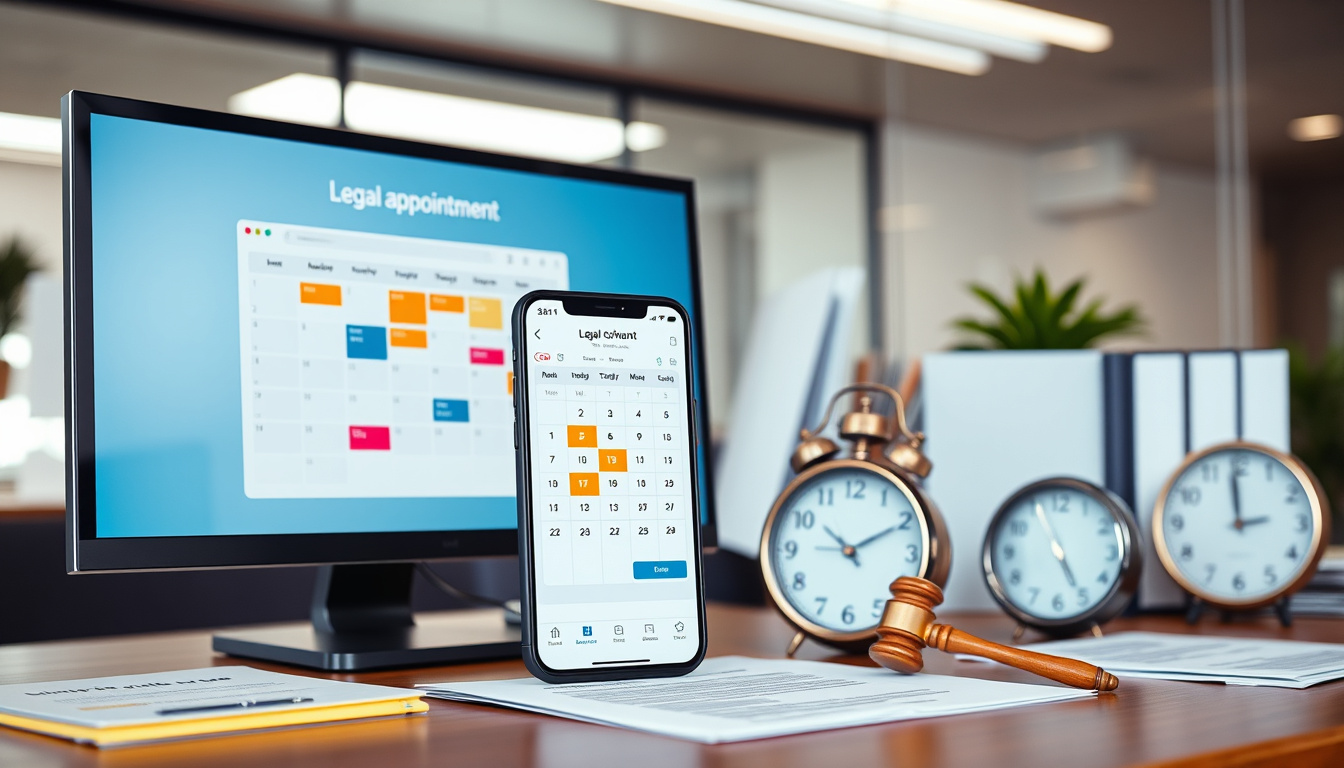In the bustling world of legal practice, where every minute counts and client satisfaction is paramount, effective legal appointment scheduling can significantly streamline operations and enhance service delivery. This article explores the importance of efficient legal appointment scheduling, dives into understanding client needs and preferences, and highlights the tools and technology that can transform your scheduling processes. We’ll also discuss best practices for managing appointments in a law firm, address common challenges faced in legal appointment scheduling, and provide insights on how to evaluate and continuously improve your scheduling strategy. By implementing these strategies, you can ensure your practice runs smoothly, freeing up time for what really matters: providing exceptional legal services.

Key Takeaways
- Efficient legal appointment scheduling enhances client satisfaction and productivity.
- Understanding client preferences is crucial for effective scheduling.
- Utilizing modern tools can simplify and streamline the appointment process.
- Implementing best practices can minimize scheduling conflicts in your firm.
- Regularly evaluating your scheduling methods can lead to continuous improvement.
The Importance of Efficient Legal Appointment Scheduling
In the fast-paced world of legal services, efficient legal appointment scheduling is crucial for maximizing productivity and enhancing client satisfaction. Law firms face the challenge of managing numerous appointments, meetings, and court dates, all while ensuring that attorneys are able to dedicate time to case preparation and client interactions. A streamlined scheduling process not only helps in avoiding scheduling conflicts but also improves the overall efficiency of the firm. By utilizing advanced tools and technologies for legal appointment scheduling, firms can automate reminders, reduce no-shows, and provide clients with a seamless experience when booking appointments. Ultimately, investing in effective scheduling solutions allows legal professionals to focus more on their core responsibilities, leading to better outcomes for clients and an improved reputation for the firm in an increasingly competitive landscape.
Understanding Client Needs and Preferences
Understanding client needs and preferences is paramount in the realm of legal appointment scheduling. Legal professionals are increasingly recognizing the importance of effective client communication and tailored services to enhance satisfaction. Clients today seek convenience and flexibility, which means that an ideal appointment scheduling system must cater to their specific preferences, whether it’s through online booking options, reminders for upcoming meetings, or adjustments for last-minute changes. By taking the time to understand these needs, law firms can create a more personalized experience that not only streamlines the appointment process but also fosters trust and loyalty. Enhanced legal appointment scheduling not only boosts efficiency within the firm but significantly improves the client’s overall experience, enabling legal practitioners to better serve their clients’ unique situations.
‘The key is not to prioritize what’s on your schedule, but to schedule your priorities.’ – Stephen R. Covey

Tools and Technology for Legal Appointment Scheduling
In the fast-paced world of law, efficient legal appointment scheduling is crucial for managing client relationships and optimizing workflow. Today’s legal professionals have access to a variety of tools and technology designed to streamline this process. Online scheduling platforms, for example, allow clients to book appointments directly through a law firm’s website, eliminating the back-and-forth of traditional phone calls. These tools often integrate with calendar applications, ensuring that lawyers are promptly updated on their daily commitments. Additionally, features such as automated reminders help reduce no-shows, saving valuable time for both clients and legal practitioners. With advanced tools like video conferencing for remote consultations, the necessity for in-person meetings has decreased, further enhancing the efficiency of legal appointment scheduling. By embracing these technologies, law firms can improve their service delivery, enhance client satisfaction, and ultimately drive business growth.
Best Practices for Managing Appointments in a Law Firm
Managing legal appointment scheduling efficiently is crucial for any law firm aiming to enhance client satisfaction and streamline operations. To achieve this, law firms should adopt several best practices. First, implementing a centralized scheduling system can help avoid double bookings and ensure that all team members are aware of upcoming appointments. This system should be accessible to both staff and clients, allowing for easy rescheduling or cancellation. Secondly, setting clear guidelines on available appointment times can help clients know when they can expect to meet with their attorneys. Additionally, utilizing automated reminders via email or SMS can decrease no-shows and enhance overall communication with clients. Lastly, continuous feedback mechanisms should be established to assess and improve the appointment scheduling process, ensuring that it meets the evolving needs of both clients and the firm. By embracing these best practices, law firms can optimize their legal appointment scheduling, leading to a more organized workflow and improved client relationships.

Overcoming Common Challenges in Legal Appointment Scheduling
Legal appointment scheduling can often be a daunting task for both law firms and clients. One of the most common challenges is managing conflicting schedules, as lawyers frequently juggle multiple cases and client commitments. Additionally, last-minute changes can create significant disruptions. To overcome these challenges, employing an efficient scheduling system is crucial. Implementing specialized legal appointment scheduling software can streamline the process, allowing for automatic reminders and easy rescheduling options. Furthermore, clear communication is essential; keeping clients informed about potential time constraints can prevent misunderstandings and improve overall satisfaction. By integrating these strategies, legal professionals can enhance their appointment systems and ensure smoother interactions with their clients.
Evaluating and Improving Your Scheduling Process
In the fast-paced legal industry, effective legal appointment scheduling is crucial for ensuring that attorneys can efficiently manage their time and provide the best service to clients. Evaluating your current scheduling process is the first step towards improvement. Begin by analyzing the existing workflow: identify any bottlenecks, such as double bookings or missed appointments, that may impact productivity. Utilize scheduling software tailored for legal practices, which often includes features like automated reminders and client self-scheduling, to enhance the process. Regularly collecting feedback from both staff and clients can also offer valuable insights, allowing you to refine your scheduling approach and minimize delays. By prioritizing these evaluation strategies, your legal appointment scheduling can become a seamless component of your practice, ultimately leading to increased client satisfaction and improved operational efficiency.


